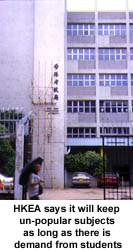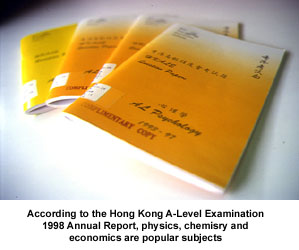Education |
Home | Archives | About | Media Links


October 1999
Unpopular A-Level Subjects - Barriers or Stepping Stones?
By Alex Chow
Miss Kimmy Luk, a year one student studying psychology in The Chinese University of Hong Kong, has been studying psychology since Form 6.
She said, "I wanted to study economics at first, but I learnt that there was no vacancy in the economic class and so I chose psychology."
In her 2 years of studying psychology in secondary school, Kimmy developed her interest in psychology and wanted to work in the field.
Now that she has entered the Psychology Department at the University, she said studying psychology in secondary school did help her in her university education.
Said she: "As I have studied psychology in matriculation, I am exempted from the fundamental course.
"In addition, I think I can learn things faster than those who haven't taken psychology before."
Although she found having taken psychology an advantage, not many students are interested in taking this subject in their A-Levels.
However, she said she was just on a slightly advantageous position compared with the others, as she only has a basic foundation of the required knowledge in psychology.
According to the Hong Kong Examination Authority, it provided a total of 28 subjects for the candidates, but there is a big contrast among the numbers of candidates in different subjects.
French has the fewest
candidates. Only two or three candidates have sat for the French
examination from 1995 onwards
.
There is no doubt that some
people will question the usefulness of setting up these subjects
for the candidates.
Mr. C.C. Choi, Secretary of Hong Kong Examination Authority, said that there is a need to provide these subjects.
Said he: "The job of the Examination Authority is to provide a service for the schools. We set up examinations to accompany the courses of the secondary schools.
"As some schools in Hong Kong are providing subjects such as French and design and technology to the students, we have to provide examinations for them."
But he added: "Still the Authority will fully utilize the resources we have. Subjects that are not practical or out-dated will either be replaced by other subjects or removed.
"For example, the authority will stop providing German examination at Certificate Level in year 2000 as there are too few candidates."
Mr. Choi stressed that there is a regular review on the subjects provided to the candidates.
"We always monitor the situation. If less and less schools are applying for a certain subject, which means there are less candidates, we will remove those subjects," Mr. Choi explained.
"By the same token, if some subjects are not practical anymore, we will remove the subjects too in order to save our resources.
"For example, Certificate Level shorthand will be dismissed in year 2001 as we consider this subject out-dated," he added.
Generally, there are three principles in deciding whether a subject will be removed or not, the secretary said.
Said Mr. Choi: "Firstly, we will see if the subjects is in the syllabus that most of the schools are using.
"Secondly, we often evaluate the need form the candidates. If there is no demand, we think it is better to remove the subject as to save and fully utilize the resources we have.
"Finally if there are new subjects that can meet the need form the society and also fulfill the role of similar subjects, we will replace the old subjects with the new ones.
Mr. Choi gave an example, "In 1991, we decided to remove Certificate Level woodwork and substitute it with the new subject design and technology. We explained to the schools that the new subject includes the old woodwork's syllabus and most schools accepted to use the new subject."
While the Examination Authority is monitoring the usefulness of the subjects, the universities in Hong Kong actually encourage students to study those subjects indirectly.
It is very common for the various departments in Hong Kong's universities to state in their prospectus that applicants should have taken some specified subjects in Certificate Level and Advanced Level.
For example, the Hong Kong University of Science and Technology's School of Engineering has stated that among the subjects required for the applicants, engineering is one of them.
However, some people who find studying unpopular subjects not useful to their university education.
Miss Tsang Wa Chung and Miss Connie Lo are year one students of the University of Hong Kong, studying in the Faculty of Arts.
Both of them have taken English literature before.
Both Tsang and Connie think that the subject does not help them much in their studies in university.
However, both of them think that studying the subject English literature is useful in some way.
Said Connie: "Studying English literature provides me with an opportunity to develop my analytical power. It makes me look at the same thing form a different perspective.
When asked if she would choose unpopular subjects again, Tsang said she thinks she would not choose English Literature, but she said she has no regrets about having chosen this subject in secondary school.
After all, as Kimmy said, the happiest thing in studies is studying the subject you like, whether the subject is popular in secondary school or not is unimportant.
Home | Archives | About | Media Links